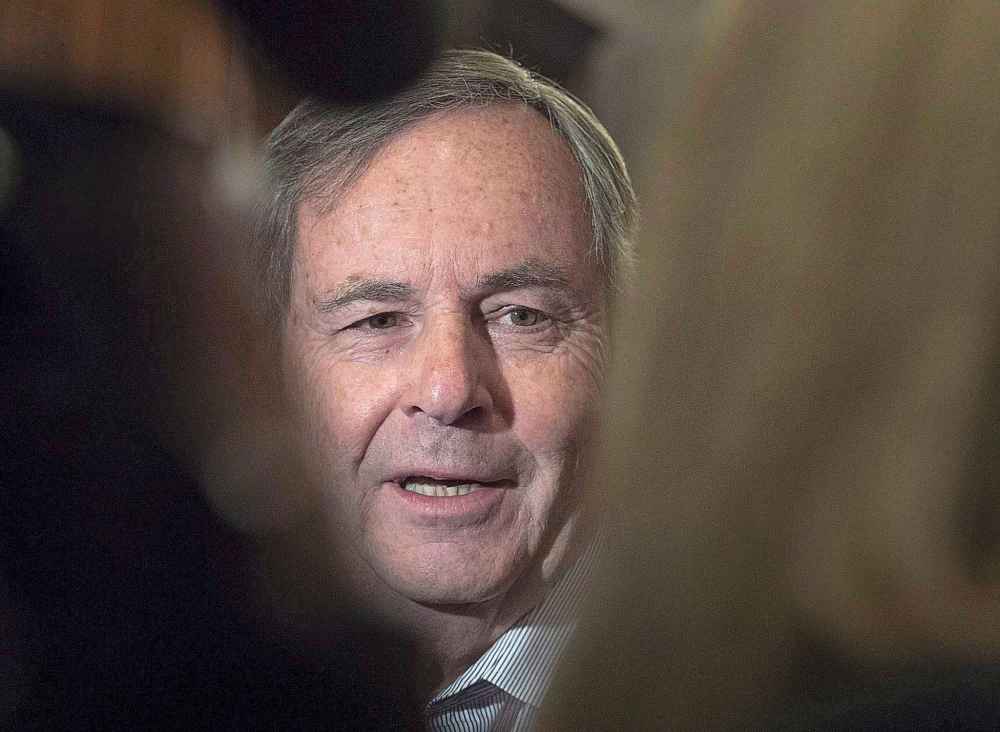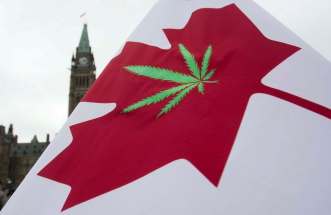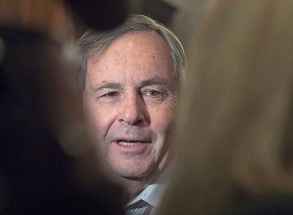Trade deal will draw investment in Manitoba, predicts Canada’s ambassador in U.S.
Read this article for free:
or
Already have an account? Log in here »
To continue reading, please subscribe:
Monthly Digital Subscription
$0 for the first 4 weeks*
- Enjoy unlimited reading on winnipegfreepress.com
- Read the E-Edition, our digital replica newspaper
- Access News Break, our award-winning app
- Play interactive puzzles
*No charge for 4 weeks then price increases to the regular rate of $19.00 plus GST every four weeks. Offer available to new and qualified returning subscribers only. Cancel any time.
Monthly Digital Subscription
$4.75/week*
- Enjoy unlimited reading on winnipegfreepress.com
- Read the E-Edition, our digital replica newspaper
- Access News Break, our award-winning app
- Play interactive puzzles
*Billed as $19 plus GST every four weeks. Cancel any time.
To continue reading, please subscribe:
Add Free Press access to your Brandon Sun subscription for only an additional
$1 for the first 4 weeks*
*Your next subscription payment will increase by $1.00 and you will be charged $16.99 plus GST for four weeks. After four weeks, your payment will increase to $23.99 plus GST every four weeks.
Read unlimited articles for free today:
or
Already have an account? Log in here »
Hey there, time traveller!
This article was published 16/10/2018 (2614 days ago), so information in it may no longer be current.
OTTAWA — Canada’s man in Washington says he’ll be luring American business to Manitoba, after the province’s manufacturers claimed they’d been undercut by investor uncertainty during months-long negotiations for a new North American trade deal.
“One of our primary areas of focus is going to be to promote investment in Canada,” David MacNaughton, Canada’s ambassador to the United States, told the Free Press. “There’s a huge amount of interest in Canada, I think, given the reduction of uncertainty.”
In a wide-ranging phone interview from Washington, MacNaughton offered a frank assessment of the United States-Mexico-Canada Agreement, a deal he’s been intimately involved in crafting since U.S. President Donald Trump’s election in November 2016.

Manitoba sold just under $9 billion in goods to the U.S. last year, accounting for 71 per cent of its exports. USMCA has secured the province’s access to the world’s largest economy, but it comes after a year of tense negotiations.
Groups such as Canadian Manufacturers and Exporters have noticed a drop in investment during the talks, with companies opting to open plants in the U.S. because it wasn’t clear how much they’d pay to import from Canada.
MacNaughton feels the new deal will help the five sectors that make up the bulk of Manitoba’s exports to the U.S.: agriculture products, planes/aircraft parts, pharmaceuticals, automotive parts and non-passenger vehicles (such as tractors and firetrucks).
He’s particularly encouraged the deal was positively received by groups representing Manitoba’s pork, grain and beef farmers.
Pallister regulation push could help U.S. trade: ambassador
OTTAWA — David MacNaughton says Manitoba Premier Brian Pallister’s push to break down inter-provincial trade barriers could lead to better co-operation with the United States. OTTAWA — David MacNaughton says Manitoba Premier Brian Pallister’s push to break down inter-provincial trade barriers could lead to better co-operation with the United States. Canada’s ambassador to the United States was at the premiers’ July meeting, during which Pallister spearheaded a push to get provinces to harmonize their rules and regulations, and cancel fees on moving products between provinces. MacNaughton agreed with Pallister’s contention that it’s often easier to export a product from the U.S. into Canada than it is for a Canadian company to ship their goods to a neighbouring province. “There’s a patchwork of regulations in the U.S., too,” MacNaughton said. “The more we can streamline the regulatory process, the better off we’re going to be.” Since 2011, the Regulatory Co-operation Council has had Canadian and American officials regularly meet to standardize their rules around food safety, vehicle regulations and health products. It’s a work in progress, with numerous small rules adjusted, largely to the benefit of small- and medium-sized businesses who want to do business on both sides of the border. He said getting the premiers looking at their own provincial rules could help drive consensus and interest in matching these rules with American ones. Pallister isn’t the only prominent Manitoban pushing to ramp up Canadian trade. Winnipeg South Centre MP Jim Carr was named Minister of Trade Diversification this summer, putting him charge of getting Canadian companies to export beyond the United States, and attracting other countries’ investment dollars. —Dylan Robertson
In June, at the end of the G7 meeting in Quebec, Trump threatened to ramp up existing tariffs on Canada. Obama-era U.S. ambassador to Canada Bruce Heyman urged Manitoba’s agriculture producers to ask their American clients to stress Canada’s importance to their political representatives.
MacNaughton couldn’t recall whether specific groups such as Keystone Agricultural Producers followed through with that approach, but he said a slew of business groups, unions and premiers were a key part of a sustained, cross-border charm offensive that included representation from Manitoba.
“A lot of that was just reaching out to their partners in trade, and I think that made a big difference,” he said. “I don’t think we would’ve been able to get it if we’d just been on our own.”
Yet supply-managed sectors have decried USMCA for undercutting a system that strictly regulates Canada’s pricing, import and production quotas for dairy, eggs and poultry. Those industries exert heavy lobbying pressure on Canada’s three main political parties.
Allowing more U.S. imports came after demands from Trump to end supply management, as well as key Congress members, including House Speaker Paul Ryan and Democratic Sen. Chuck Schumer.
“Given where they were, there was just no way that we were going to get this deal renewed without giving something on dairy,” MacNaughton said.
USMCA ended a pricing category for industrial milk ingredients known as Class 7, which dairy farmers say will make redundant a newly opened Dairyland facility in Winnipeg, while opening supermarket shelves to products from hormone-fed American cows.
When asked if dairy farmers’ concerns are overblown, MacNaughton simply repeated that Canadian producers still have access to 90 per cent of the Canadian market. “It’s a pretty positive package,” he said.
Provincial drug costs may rise
wfpsummary:OTTAWA — David MacNaughton, Canada’s ambassador to the United States, said Ottawa is still analyzing the impact of USMCA changing drug-patent rules.:wfpsummary
OTTAWA — David MacNaughton, Canada’s ambassador to the United States, said Ottawa is still analyzing the impact of USMCA changing drug-patent rules.
The trade deal has Canada raising its data protection for biologics from 8 to 10 years, meaning it will take longer for generic versions of those pharmaceuticals to hit the market.
That could mean an extra toll on provincial health plans, especially from aging baby-boomers.
“It obviously has the potential of ending up costing provincial governments more. It’s hard to tell, but there are estimates,” MacNaughton said. “We haven’t fully costed it out, and [we’re going] to figure out what the potential additional costs to the provincial government plans are.”
—Dylan Robertson
The Conservatives have homed in on Canada’s concessions, declaring them a “failure” that will hurt the economy. Tory Leader Andrew Scheer claimed he would have signed a better deal, without explaining how.
MacNaughton defends USMCA for preserving the dispute-resolution mechanism while eliminating a clause that favoured the U.S.
“Is that really a win? Well you know what: in today’s world, creating certainty around the investment climate and the trading climate is a win. It’s hard to see any areas where there isn’t uncertainty,” he said.
The ambassador says now spends “almost 100 per cent” of his time trying to end American tariffs on steel and aluminum, which weren’t resolved in the Sept. 30 deal.
“We could have done it as part of the renegotiation of the NAFTA. But the terms they were proposing were just not acceptable to us, and we didn’t have enough time to actually deal with it. And frankly, our view is that those are unwarranted and illegal tariffs in the first place.”
MacNaughton spoke with four senators Monday and has “a whole bunch of other people in Congress and the administration that I’ll be calling for the rest of the week,” he said.
MacNaughton admits it’s taking some time to get used to calling the deal “USMCA.” He claimed he likes the ring the acronym gives, comparing it to the Village People’s 1978 hit song, Y.M.C.A.
On Monday, Prime Minister Justin Trudeau referred to the deal as the “new NAFTA” at a Toronto business forum, prompting the moderator to ask if that’s what he calls it.
“No, I call it the USMCA, ’cause that’s a great new name that I think makes a real difference in the quality of the accord,” Trudeau said in a heavily sarcastic tone.
dylan.robertson@freepress.mb.ca









